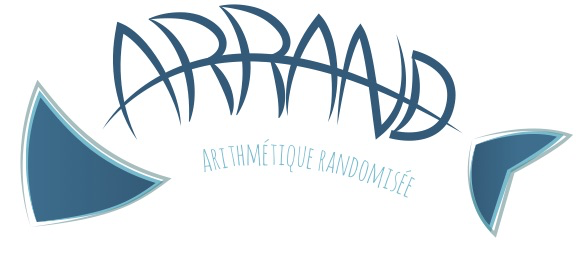

____________
__________
Arithmétiques Randomisées -- Randomized Arithmetic
ANR-15-CE39-0002-01
__________
Description :
Le principe de l'arithmétique randomisée est de faire que deux exécutions successives avec les mêmes entrées, et donc pour un même résultat, donnent deux traces d'exécution différentes. L'idée sous-jacente est de rendre toute corrélation impossible, en particulier dans le cadre de la cryptographie où une clé secrète est fixée. Afin d'offrir une contre-mesure indépendante du support et de l'algorithme cryptographique, nous proposons d'utiliser une arithmétique randomisée où la base est tirée aléatoirement.
Nous proposons d'étudier deux types de systèmes de numération : les residue number systems basés sur le théorème des restes chinois et les bases adaptées basées sur des réseaux euclidiens. Ces deux systèmes semblent assez propices pour cette approche. Nous proposons donc d'en étudier les qualités en termes d'aléa.
The main purpose of the randomized arithmetic is to ensure that two successive computations, with the same inputs and the same output, give two different traces of execution. The underlying idea is to make impossible to establish a correlation, in particular in the context of cryptography where a secret key is fixed. The goal is to offer a counter-measure independent of the support and of the cryptographic algorithm. Thus, we suggest the use of a randomized arithmetic with a base which is taken randomly.
We propose to study two types of number systems: Residue Number Systems issued from the Chinese Remainder Theorem, and Adapted Bases dealing with Euclidean lattices. These two systems seem to be very good candidates for this approach, and we propose to study their random behaviors.
Membres
Groupes de travail
Publications
Membres :
- Lokmane Abbas-Turki, LPMA CNRS-UPMC, web
- Jean Claude Bajard, LIP6 CNRS-UPMC, web
- Laurent-Stéphane Didier, IMATH U.T., web
- Philippe Elbaz-Vincent, Institut Fourier CNRS-UGA, web
- Pierre Alain Fouque, IRISA CNRS-UR1, web
- Didier Piau, Institut Fourier CNRS-UGA, web
PhD:
- Jérôme Courtois, LIP6 CNRS-UPMC, web
- Jérémy Marrez , LIP6 CNRS-UPMC, web
Ingénieur:
- Titouan Coladon, Institut Fourier CNRS-UGA, web
Groupes de travail :
- 15 février 2016 : réunion de lancement Paris
- 12 avril 2016 : Grenoble
-
Marie-Angela Cornelie : Implantations et protections de mécanismes cryptographiques logiciels et matériels
- 15-16 novembre 2016 : réunion Paris
-
Jérémy Marrez : Problématique des Bases Adaptées l'Arithmétique Modulaire
-
Jérôme Courtois : Etude du comportement aléatoire d'une arithmétique RNS tirée aléatoirement
-
Vincent Zucca : Implantation fortment RNS d'un chiffrement homomorphique du type FV
- 23 mai 2017 : réunion Paris
-
Jérémy Marrez : Algortihmes de recherche de Bases Adaptées l'Arithmétique Modulaire
-
Lokmane Abas Turki : Resilience of randomized RNS cryptosystem with respect CPA, DPA and DPA square
- 26 septembre 2017 : Paris, visite Laurent-Stéphane Dider
-
Groupe de travail : Réduction des Coefficient dans les Bases Adaptées l'Arithmétique Modulaire
- 17 octobre 2017 : réunion Paris visite Philippe Elbaz-Vincent suivi des thèses
-
Jérémy Marrez : Algortihmes de recherche de Bases Adaptées l'Arithmétique Modulaire
-
Jérôme Courtois : Randomized RNS cryptosystem with respect CPA, DPA and DPA square
-
Vincent Zucca : Homomorphic implementation using RNS
- 10 juillet 2018 : réunion Paris visite Philippe Elbaz-Vincent, bilan mi-parcours
- 19 mars 2019 : réunion Paris visite Philippe Elbaz-Vincent, préparation WRACH Roscoff
- 15-19 avril 2019 : WRACH Roscoff
- 06/12/2019 : Soutenance thèse Jérémy Marrez, 10h - Campus Jussieu, salle Jacques Pitrat (25-26/105)
- Membres du jury :
Mme Marine Minier, Professeure, Université de Lorraine [rapporteur]
M. Clément Pernet, Maître de conférences HDR, Université Grenoble Alpes [rapporteur]
M. Lokmane Abbas-Turki, Maître de conférences, Sorbonne Université
M. Jean-Claude Bajard, Professeur, Sorbonne Université
M. Louis Goubin (examinateur), Professeur, UVSQ
Mme Annick Valibouze, Professeure, Sorbonne Université
- 14/01/2020 : Aspects algorithmique des réseaux algébriques, Paris
-
M. Philippe Elbaz-Vincent , Professeur, Université Grenoble-Alpes,
M. Claus Fieker, Professor Dr., Technische Universitat Kaiserslautern,
Mme. Valérie Berthé, Directrice de Recherche, IRIF,
M. Pierre-Alain Fouque, Professeur, Université de Rennes,
M. Antoine Joux, Tenured Research Faculty , CISPA, Helmholtz Center,
Mme. Ariane Mézard, Professeur, IMJ-PRG, Sorbonne Université,
M. Phong Nguyen , Directeur de Recherche, INRIA,
Jean Claude Bajard, Professeur Sorbonne Université
Publications :
- Jean-Claude Bajard, Julien Eynard and Nabil Merkiche,
Multi-fault Attack Detection for RNS Cryptographic Architecture,
2016 IEEE 23nd Symposium on Computer Arithmetic, July 2016, Santa Clara, California, US, pp. 16 - 23 DOI 10.1109/ARITH.2016.16 ... pdf
- Jean-Claude Bajard, Julien Eynard, Anwar Hasan and Vincent Zucca
A Full RNS Variant of FV like Somewhat Homomorphic Encryption Schemes,
SAC 2016, Selected Areas in Cryptography, St. John's, Newfoundland and Labrador, Canada IACR ePrint 2016/510 ... pdf
- T. Espitau, P.A. Fouque, B. Gérard and M. Tibouchi,
Loop abort Faults on Lattice-Based Fiat-Shamir & Hash'n Sign signatures
SAC 2016, pp., Springer-Verlag, 2016.23rd Conference on Selected Area In Cryptography, Saint John's, Canada (2016)
- J.C. Bajard, J. Eynard : RNS Approach in Lattice-Based Cryptography, chapter in Embedded Systems Design with Special Arithmetic and Number Systems, pp. pp 345-368, (ISBN: 978-3-319-49741-9) (21 March 2017)
- P. Martins, J. Eynard, JC Bajard, L. Sousa : Arithmetical Improvement of the Round-Off for Cryptosystems in High-Dimensional Lattices, IEEE Transactions on Computers ( Volume: PP, Issue: 99 ) DOI: 10.1109/TC.2017.2690420, 03 April 2017.
- L. A. Abbas-Turki and S. Graillat,
Resolving small random symmetric linear systems on graphics processing units
The Journal of Supercomputing,
April 2017, Volume 73, Issue 4, pp 1360-1386
- P.A. Fouque, et al,
Side-Channel Attacks on BLISS Lattice-Based Signatures
Exploiting Branch Tracing Against strongSwan and Electromagnetic Emanations in Microcontrollers,
2017 ACM Conference on Computer and Communications Security (CCS 2017), Dallas, TX, USA, pp. 1857-1874, (ACM) (2017)
- J.C. Bajard, J. Eynard, N. Merkiche : Montgomery reduction within the context of residue number system arithmetic, Journal of Cryptographic Engineering, (Springer) DOI: 10.1007/s13389-017-0154-9, (electronic 07 March 2017), vol. 8 (3), pp. 189-200, (Springer) (2018)
- T. Espitau, P.A. Fouque, B. Gérard and M. Tibouchi,
Loop-Abort Faults on Lattice-Based Signatures and Key Exchange Protocols
IEEE Transactions on Computers, vol. 67 (11), pp. 1535-1549, (Institute of Electrical and Electronics Engineers) (2018)
- P. Martins, J. Marrez, J.‑C. Bajard, L. Sousa : HyPoRes: An Hybrid Representation System for ECC, 2019 IEEE 26th Symposium on Computer Arithmetic (ARITH), Kyoto, Japan, pp. 207-214, (IEEE) (2019)
- L.‑S. Didier, F.‑Y. Dosso, N. El Mrabet, J. Marrez, P. Véron :Randomization of Arithmetic over Polynomial Modular Number System, 26th IEEE International Symposium on Computer Arithmetic, vol. 1, Proceedings of the 2019 IEEE 26th Symposium on Computer Arithmetic, Kyoto, Japan, pp. 199-206 (2019)
- Ph. Aubry, J. Marrez, A. Valibouze : The Real Transform: Computing Positive Solutions of Fuzzy Polynomial Systems, 11th International Conference on Fuzzy Computation Theory and Applications, vol. 1: FCTA, Proceedings of the 11th International Joint Conference on Computational Intelligence, Vienna, Austria, pp. 351-359, (SciTePress - Science and Technology Publications) (2019)
- J. Marrez : Arithmétiques Randomisées pour la cryptographie, thèse, soutenance 06/12/2019, direction de recherche Bajard, Jean-Claude, co-encadrement ABBAS-TURKI Lokmane (2019)
- J. Courtois, L. Abbas Turki, JC Bajard,
Resilience of randomized RNS cryptosystem with respect CPA, DPA and DPA square, IEEE Transactions on Computers, vol. 68 (12), pp. 1720-1730, (Institute of Electrical and Electronics Engineers) (2019)
- ...
ANR ARRAND



